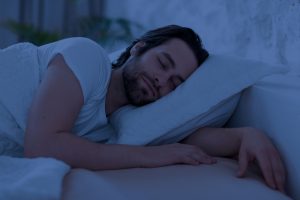Researchers from LMU, the Max Planck Institute for Human Development and the University of Oxford have investigated how sleep affects memory. They found a connection between breathing and the emergence of certain brain activity patterns during sleep that are associated with the reactivation of memory content. The data points to possible consequences of unhealthy breathing on memory. How are memories consolidated during sleep?
Researchers led by Dr. Thomas Schreiner, head of the Emmy Noether junior research group at the LMU Institute of Psychology, had already shown in 2021 that there is a direct connection between the development of certain sleep-related brain activity patterns and the reactivation of memory content during sleep. However, it was still unclear whether these rhythms are orchestrated by a central pacemaker. The researchers therefore re-analyzed the data together with scientists from the Max Planck Institute for Human Development in Berlin and the University of Oxford. Their results identified breathing as a potential pacemaker, meaning that our breathing influences how memories are consolidated during sleep.
How Breathing and Sleep are Related
For their original study, researchers showed 120 images to 20 study participants over the course of two sessions. All pictures were associated with specific words. The participants then slept for around two hours in the sleep laboratory. When they woke up, they were asked about the associations they had learned. During the entire learning and sleeping phase, their brain activity and breathing were recorded using EEG. The researchers found that previously learned content is spontaneously reactivated by the sleeping brain in the presence of so-called slow oscillations and sleep spindles (short phases of increased brain activity). The precision of the coupling of these sleep-related brain rhythms increases from childhood to adolescence and decreases again with increasing age.
Since breathing frequency also changes with age, the researchers then analyzed the data in relation to recorded breathing and were able to establish a connection between them: The results show that breathing and the formation of characteristic slow oscillation and spindle patterns are linked . Although other studies have already found a connection between breathing and cognition while awake, this work makes it clear that breathing is also important for memory processing during sleep.
Older people often suffer from sleep disorders, breathing problems and declining memory function. The researchers wanted to investigate whether there are connections between these phenomena and whether interventions – such as the use of CPAP masks, which are already used to treat sleep apnea – make sense from a cognitive perspective.
How Sleep Strengthens Memory
Although sleep is known to play a crucial role in strengthening memory, scientists are still trying to decipher how this process occurs in the brain overnight. Research led by scientists at UCLA Health and Tel Aviv University provides the first physiological evidence from inside the human brain that supports the prevailing scientific theory about how the brain consolidates memory during sleep. In addition, the researchers found that targeted deep brain stimulation during a critical time in the sleep cycle appeared to improve memory consolidation. New research provides the first physiological evidence from inside the human brain that supports the prevailing scientific theory about how the brain consolidates memory during sleep. Additionally, deep brain stimulation during a critical time in the sleep cycle appeared to improve memory consolidation.
The research, published in Nature Neuroscience, could provide new clues into how deep brain stimulation during sleep could one day help patients with memory disorders such as Alzheimer’s disease. This was achieved using a novel “closed-loop” system that delivered electrical pulses in one brain region precisely synchronized with brain activity recorded in another region. According to the prevailing theory about how the brain converts new information into long-term memory when going to sleep, there is a dialogue overnight between the hippocampus – the brain’s memory center – and the cerebral cortex, which is associated with higher brain functions such as thinking and planning.
This occurs during a period of deep sleep, when brain waves are particularly slow and neurons in all brain regions alternate between rapid, synchronous firing and silence. This provides the first important evidence at the level of individual neurons that this interaction mechanism between the memory center and the entire cortex actually exists. It has scientific value both for understanding how memory works in humans and for using that knowledge to truly strengthen memory. Researchers had the unique opportunity to test this theory of memory consolidation using electrodes in the brains of 18 epilepsy patients at UCLA Health. The electrodes were implanted in patients’ brains to identify the cause of their seizures during hospital stays, typically about ten days.
Deep Brain Stimulation
The study was conducted over two evenings and mornings. Just before bedtime, study participants were shown pairs of photos of animals and 25 celebrities, including easily recognizable stars like Marilyn Monroe and Jack Nicholson. They were immediately tested on their ability to remember which celebrity was paired with which animal, and they were tested again the morning after a night of undisturbed sleep. Another night, they were shown 25 new animal and celebrity pairings before bed. This time they received targeted electrical stimulation overnight, and in the morning their ability to remember the matings was tested.
To deliver this electrical stimulation, the researchers had developed a real-time, closed-loop system that Fried compared to a musical conductor: the system “listened” to the brain’s electrical signals, and when patients fell into the phase of deep sleep, the Associated with memory consolidation, it delivered gentle electrical pulses that instructed the rapidly firing neurons to “play” in synchrony. Each person tested performed better on memory tests after a night of electrical stimulation than after a night of undisturbed sleep. Key electrophysiological markers also suggested that information flowed between the hippocampus and the entire cortex, providing physical evidence of memory consolidation. The researchers found that this highway, through which information flows to more permanent storage locations in the brain, could fundamentally be improved. The next challenge would then be whether the researchers will be able to modulate certain memories.








